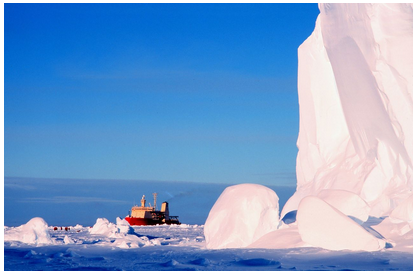Ice Melts: Recent Researches by Rutgers Unsettle Previous Theories

Ross Eye Shelf, the largest Ice shelf in statements about the ice melt in the iced continent. Antarctica. Picture credits: wikipedia.com)
February 20, 2015
Every day, each person in the world uses about 80-100 gallons of water. Considering that there is about 7 billion of us, it is incredible how much water we use every day. A lot of the water we have comes from glaciers and icebergs, melting everyday because of a combination of natural phenomena and pollution.
“Every day I use about 1 or 2 gallons of water and I think that, considering our bodies are made up of 75% of water, it is not a lot. It is important to save water, but this shouldn’t mean that we have to be dehydrated,” said Sara Nagie when interviewed.
The Antarctic ice sheet, the thick layer of ice that covers the continent, contains about 70% of the world’s fresh water. Last May, researchers published an article in The New York Times that presented a many of results and statements about the ice melt in the frozen continent.
According to the article, a vast section of the western part of the Antarctic ice sheet had already begun melting and this process looked unstoppable. In coming centuries, the level of water could rise about 10 feet, and a part of the Antarctica could disappear.
But why did the ice melt? Global warming caused by the human-driven release of greenhouse gases helped destabilize the ice sheet. But this is not the only cause.
Some scientists state that other minor factors may have been involved. The relatively warm water that occurs naturally in the depths of the ocean was being pulled to the surface by powerful winds that encircle Antarctica. Even though this wind usually protects the continent and keeps the surface cold, global warming has made the winds change, turning this whole event into a cause of the melting ice sheets.
After a few months, precisely on January 14th, a new article about the same topic came out in the same newspaper, reporting the results of some new studies. A team of researchers working from Rutgers University unexpectedly discovered that the ocean is not rising quite as much as the scientists previewed.
To find this out, they made a tiny adjustment that could possibly revolutionize the concept of the ice melt. The researchers reported that the ocean did not rise quite as much as they had previously believed. In fact, instead of rising about six inches over the course of the 20th century, the sea actually rose by approximately five inches. One single inch turned out to be a huge amount of water, though. With only one less inch of water in the sea, three billion Olympic-size swimming pools could be filled. These results are now very important to update the theory which made the previous scientists preview a bigger amount of melted ice than there actually was.
When interviewed, Julie Kluse said: “I think this research is very shocking; global warming has always been known as a problem and it is not as terrible as I originally thought, which gives hope to helping slow the rate of melting.”











